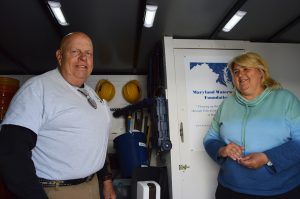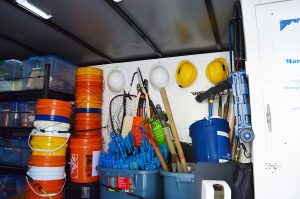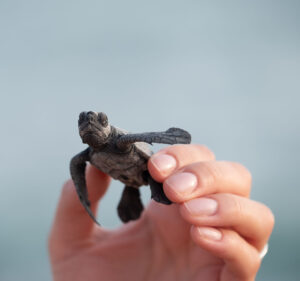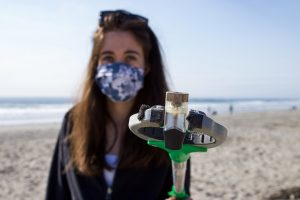Back in the 1960s, friends of Sam Weaver saw a bright red cooler floating down the stream during a storm outside their house in Towson, MD, on the north side of Baltimore County. A few months later when they were hanging out on their boat at his father’s marina in Essex, nearly 15 miles east, they watched that same exact cooler float past.

This is when a light bulb went off for Weaver, who’s been in the boating business his entire life. The owner of what is now Weaver’s Marine Service boatyard along Back River in Essex realized that no matter where trash is dumped, it almost always ends up in our waterways.
The Chesapeake Bay is the largest estuary in North America, and Maryland is one of six states that make up the Chesapeake Bay Watershed, which spans over 64,000 square miles. This means direct trash pollution not only affects the health of the 100,000 streams and rivers that flow into the Bay, but threats arise from stormwater runoff, fertilizer, debris, oils, chemicals and much more.
The Maryland Waterways Foundation (MWF) is a grassroots organization with a mission to clean up the Bay through education, community involvement and volunteer work. Founded in 2019 by Weaver alongside Karen Wynn, this nonprofit is a hands-on effort hosting fundraisers and events that get down and dirty in stream cleanups. Their 28-foot cleanup trailer is equipped with all the tools — trash pickers, bags, buckets, gloves, etc. — and it will drive to any site that needs restoration.
This is nothing new to Weaver and Wynn who have been cleaning up Southeast Baltimore County for five years with Back River Restoration Committee, but decided to branch off to expand its outreach. Relying solely on volunteers, MWF also offers service learning hours and works with youth programs such as the Boy Scouts’ Venturing Crew 726 and Sea Scout Ship 7117, as well as summer internships for college students majoring in environmental studies.
With the help of donations, sponsors, fundraisers and a few grants from Baltimore County, most supplies are stored in Weaver’s garage. Some also come from friends and generous neighbors who lend equipment such as excavators, dump trailers and most importantly — helping hands. Along with trash cleanups, they organize tree plantings, storm drain markings, food drives and work with the Baltimore County Police Marine Unit to retrieve and destroy abandoned boats.

Last year, MWF collected more than 190,000 pounds of trash, 200 tires and at least five abandoned boats, kept sustainable food from being wasted in landfills, and redistributed it to those in need. The team organizes events across the county from northern towns such as Lutherville, all the way south to Sparrows Point. Last year’s mile-long cleanup on Grays Road along Sparrows Point Country Club had 200+ people attend and collected 29,000 pounds of trash. Attendees also often include county executives and council members.
As Weaver and Wynn have worked diligently toward conservation efforts through networking and collaborating with groups such as the Coastal Conservation Association and Maryland Environmental Service, hyperlocal connections are the backbone of their success. In the first year alone, they raised $85,000 and accumulated 46 pieces of equipment. For Weaver’s 70th birthday, $6,000 was raised solely for MWF.
“If we can get 10 more groups to do what we’re doing and 10 people see those 10 groups doing it, then maybe the word will spread. More people will realize if they see their neighbor picking up trash, they’ll think, well maybe I shouldn’t throw trash out of the window,” says Weaver. “Hopefully it gets contagious and grows.”
Additional co-founders include the Marine Trades Association of Baltimore County, Hart-Miller Island Citizens Oversight Committee, Eastern Baltimore County Task Force, Baltimore County Commission for Environmental Quality, as well as various local businesses, civic, community and yacht club organizations.
MWF also gives fun incentives for those involved as it hosts huge events throughout the summer including the Upper Bay Snakehead Bass Tournament on August 14.
“We continue to educate ourselves on ways to help the environment, so we can share that with other people,” says Wynn. “We can clean up trash for the rest of our lives but we need to train kids and adults — more so the adults — on learning new habits of how to properly clean up trash, reduce, reuse and recycle.”





